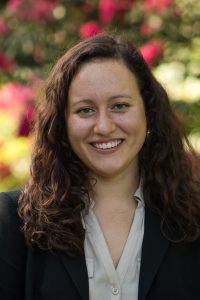May 31, 2021

Name: Caroline Nelson
Major: Biology (Chemistry minor)
Fall 2021 Peer Mentor
What is your goal in studying science?
I hope to attend a combined M.D. Ph.D. program following graduation, so that I may use my research to benefit my future patients, as well as medicine as a whole.
What does STAMPS mean to you?
The STAMPS program opened so many doors that I didn’t even know existed. The advisors are phenomenal, and have supported me not only in my research, but also in my personal and career endeavors. Through the scholarship, I found incredible mentors that have helped me secure a prestigious internship as a freshman, and the MARC U-STAR research fellowship during my sophomore year. Ultimately, the STAMPS program led me to pursue a career as a physician scientist.
What advice would you offer incoming students?
It’s never too soon to get involved in research! I remember being very self-conscious about the lack of coursework I had taken prior to joining a lab (as a second semester freshman). I did have to work a little harder than others to ensure I understood the experiments, but I believe that getting into the habit of deeply understanding my work has made me a better researcher, and the knowledge base has certainly helped with the classes I took later in my sophomore and junior years.
What is your research project?
I work with Dr. Patel in the Biology department studying the effects of the grapefruit flavanone naringenin on breast cancer and Diabetes Type 2 metabolism. Currently, I am being trained in cell culture, which I have thoroughly enjoyed!
What have you found in your research?
Throughout my time in Dr. Patel’s lab, we’ve identified several proteins that are critical to the survival and proliferation of both breast cancer and insulin-resistant adipocytes that are influenced by the presence of the flavanone naringenin.
What is the significance of your research?
My project is taking some key steps in identifying how naringenin is beneficial to the treatment of different diseases, which will hopefully be applicable to future studies for the use of the flavanone in humans.
Where have you presented your research?
I have presented my findings in three poster presentations at the Annual Biomedical Conference for Minority Students, the State of North Carolina Undergraduate Research and Creativity Symposium, and the Thomas Undergraduate Research and Creativity Expo. I have also given an oral presentation with another member of the lab in the Thomas Undergraduate Research and Creativity Expo.
How has undergraduate research been beneficial for you?
Participating in research changed my career goals. While I have always been interested in conducting research, I didn’t know how fascinating and exciting I would find it to be. I realized that, through research, I could have a broader impact on my community while constantly pushing myself to learn and grow. My experiences have shown me that research has the potential to be my ideal career, with endless possibilities of inquiry and understanding.
What was the most surprising thing about undergraduate research?
Research has opened up far more doors for me than I had expected. I have discovered so many opportunities just by participating in undergraduate research, from workshops, trainings, and presentations to networking, making new friends, and taking part in summer projects at external institutions.